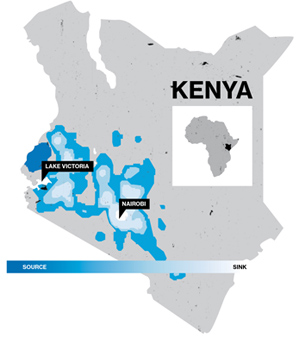 While the insights on the correlation between movement of people and malaria prevalence were useful, creating timely and precise interventions to communities that were at risk was of particular interest to the researchers. MIT Technology review notes the research is the largest attempt to use data from cell phones as an epidemiological tool.
While the insights on the correlation between movement of people and malaria prevalence were useful, creating timely and precise interventions to communities that were at risk was of particular interest to the researchers. MIT Technology review notes the research is the largest attempt to use data from cell phones as an epidemiological tool.
However, according to James Gicheru of Dimension Data, for African countries to move from piecemeal temporary projects to wide scale continuous deployment, the foundation of automated processes needs to be laid first.
“The Health sector will have to take significant strides in further embracing IT for example the first step would be to have a consolidated national healthcare system. This would go a long way in providing insight to the government for planning purposes and medical research,” says Gicheru.
Madung adds another angle, saying, data by itself, has limitations that need context to gain maximum benefits of unstructured data.
“Big data in some way needs big theory. Data science teams must consist of at least one person conversant with the domain in which they are dealing with. This kind of data can allow people to come up with spurious conclusions quite often and this can be mitigated with proper domain expertise and context,” says Madung.
Better results
Mbwana Alliy, Managing Partner of Savannah Fund, sees big data deepening financial services in Africa where companies like MoDE and First Access are creating intelligent risk credit scoring through mobile money systems and, “where banks in Africa have been too cautious in the past given lack of either collateral or credit history.”
Alliy says big data, combined with machine learning, can transform education and health in the continent.
“Whilst the growth of mobile devices such as tablets will help bring content to students, there is a big data opportunity to deliver test taking and content systems that measure and adapt to students challenges and learning,” says Alliy.
Alliy is of the opinion big data is not only a useful tool that can transform businesses and governments but also evolving as the core business in some areas.
“Big data is now disrupting the taxi industry because of the way it can efficiently match and predict the demand and supply of transportation services…Uber is really a big data company in disguise of a taxi ordering app.”
Dr. Gilbert Saggia, Kenya Country Manager for Oracle, more or less agrees with Ally, predicting companies will convert big data to data capital.
“Data is now a kind of capital. It’s as necessary for creating new products, services and ways of working as financial capital. For CEOs, this means securing access to, and increasing use of, data capital by digitizing and datafying key activities with customers, suppliers, and partners before rivals do,” says Saggia.
In agriculture, big data analysis is allowing farmers in parts of Africa get better yields by capturing accurate date on rainfall, soil, market prices and other variables which gives way to better decision-making.
But in spite of the potential of big data in Africa, a cultural and structural paradigm change needs to happen in the continent. Governments need to fast-track automation of processes, allow researchers to access data sets within the law and more importantly, act decisively on the outcomes of big data analysis.




































